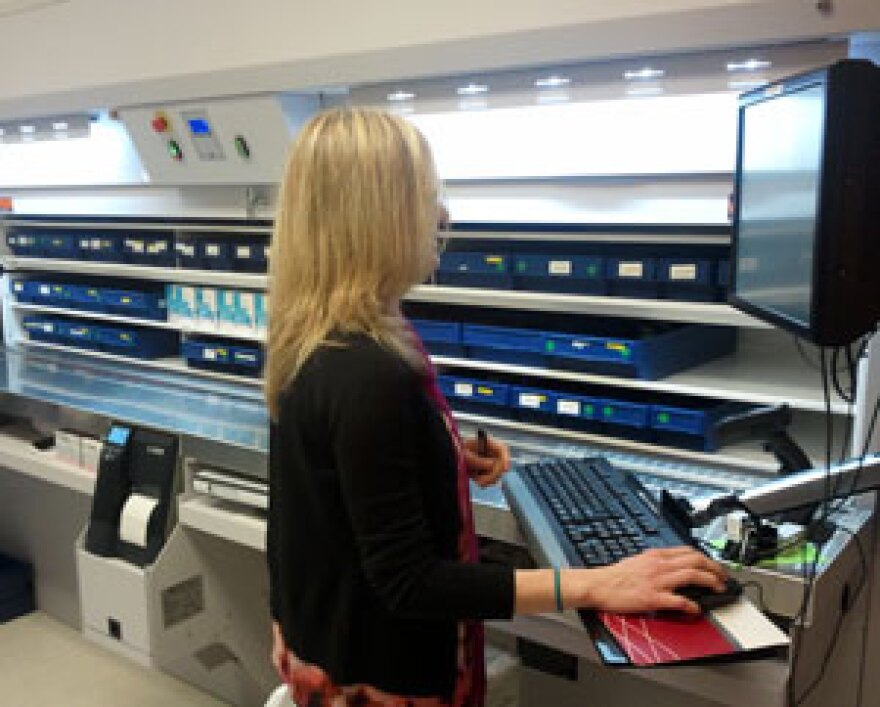http://66.225.205.104/MT20120224.mp3
Three drug manufacturers are ramping up production of a life-saving cancer drug often used to treat children. That's because a national shortage of the drug, methotrexate, became so severe that some hospitals worried they might run out of it.
In Chapel Hill, the shortage has forced the N.C. Cancer Hospital to cut down the number of days a week it gives patients methotrexate. It's the most recent example of a larger problem of drug shortages, and many doctors and pharmacists say the problem is getting worse.
A machine whirrs to life at the N.C. Cancer Hospital, sliding rows of chemotherapy drugs up and down, kind of like an elevator. When it stops, pharmacist Michelle Gardiner pulls a plastic bin out of the bottom row. "This is our preservative-free methotrexate," Gardiner said.
The drug is critical for curing several diseases, including a type of bone cancer and childhood leukemia. Vials of it are stored here in little boxes. "If you were going to remove any vials, just pull out what you want to take out, scan the barcode, and it keeps an active inventory," Gardiner said. This is how the hospital tracks how much of each chemotherapy drug it has.
That preservative-free methotrexate? Lately, there hasn't been much.
"It was getting to be very severe," Gardiner said. "We had done a good job of managing the supplies we had, but we were to the point where we needed to schedule patients closer together to make the best use out of our supply." Gardiner said all the patients who need methotrexate are still getting the drug. But starting this week, the hospital had to change some of those patients' schedules. Now it's only available one day a week instead of two for kids who come in to get injections.
She said this is the first time a drug shortage forced the hospital to change its treatment schedule. But she said dealing with drug shortages is nothing new. In fact, they've become such a problem that there's now a sort of drug-shortage czar at UNC Hospitals, which includes the cancer hospital. Her name is Maryann Oertel, and managing drug shortages has been her full-time job since the summer.
"We have a list of about 150 products that we're tracking," Oertel said. "It's a 40-page spreadsheet, and this has been going on for at least a year to a year-and-a-half that we have had this many shortages that we've been trying to manage," Oertel said most of those are generic injectable drugs, like methotrexate, and many are life-saving.
Carolinas HealthCare System, headquartered in Charlotte, maintains a similar list. Dr. Derek Raghavan is the president of the Levine Cancer Institute there. He said the institute is squeaking by with methotrexate, but the hospital has run out of several other drugs, including one for ovarian cancer, Doxil.
"There is a variant of that product that you can use," Dr. Raghavan said. "It's a bit more toxic, and it doesn't work quite as well." And that's what patients are getting all over the country, at least until foreign shipments of Doxil reach American hospitals. That's the Food and Drug Administration's temporary fix for the shortage. But the overall problem of drug shortages is getting worse, said Joseph Hill, a lobbyist for the American Society of Health-System Pharmacists.
"It's really a national crisis," Hill said. "We're hearing from our members all the time that they're scrambling to find product, and that it's a very serious problem."
Hill said 2011 was a record-setting year for drug shortages - the association counted 267. In the association's most recent survey, 90 percent of the hospitals and health systems that responded said shortages are impacting them. He said there are several causes, including quality problems shutting down manufacturing lines, companies merging so there aren't as many drug makers, and manufacturers just deciding not to make certain crucial drugs anymore.
Maryann Oertel, the drug shortage czar at the N.C. Cancer Hospital, said there's a clear reason manufacturers do that - money. "The generic injectable products are not as profitable for the manufacturers, so we've seen that if they have a choice, they shut down a production line for one of these generics and divert it to producing something that they make more money on," Oertel said.
A few manufacturers we talked to wouldn't discuss that issue. The methotrexate shortage occurred after the FDA found problems at one of the largest manufacturers of the drug. Production shut down. The FDA announced this week that three other manufacturers are now making more of the drug. The N.C. Cancer Hospital already received some.
Mary DePuew Kamm didn't have to worry about all that when she - and her son - needed methotrexate. A year and a half ago, she had a successful bone marrow transplant - a procedure the doctor told her methotrexate was crucial for. She had already heard of the drug. Three decades ago, her son was diagnosed with the type of childhood leukemia that methotrexate can help cure. In his case, it did. "I really don't know that we would necessarily be here today without those agents," DePuew Kamm said.
She said she can't imagine what it would be like for a patient who needs it today to worry there's not enough. "It's unconscionable," DePuew Kamm said. "It just makes me very, very angry, and I am deeply concerned about the people who are currently in treatment and people who've not yet been diagnosed. And I don't understand."
Even though patients shouldn't have to worry much longer about methotrexate, the American Society of Health-System Pharmacists lists more than two hundred drugs - many of them life-saving - that are still in short supply.

